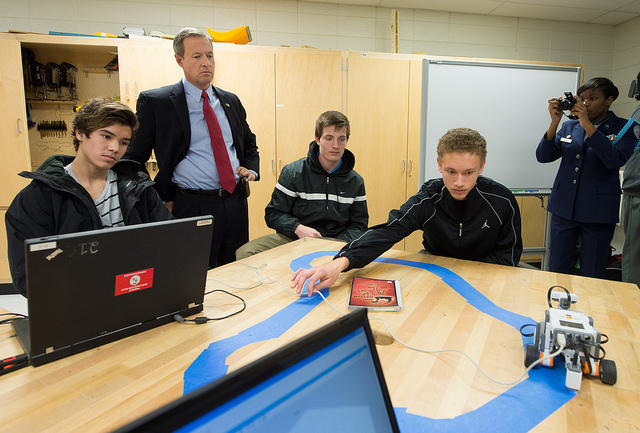Without teacher guidance, all the tech in the world will be quite useless

**The Edvocate is pleased to publish guest posts as way to fuel important conversations surrounding P-20 education in America. The opinions contained within guest posts are those of the authors and do not necessarily reflect the official opinion of The Edvocate or Dr. Matthew Lynch.**
Kentaro Toyama, University of Michigan
A couple of years ago, I taught an afterschool class at a Seattle nonprofit, the Technology Access Foundation (TAF), which provides STEM education (science, technology, engineering, math) to children from less-privileged backgrounds. My students were 8-11 years old, and it was the first time that I had taught elementary school students.
The curriculum devised by TAF’s staff involves hands-on interaction with laptops to explore programming, robotics and audio editing. With a PhD in computer science and a range of experience teaching older students, I thought it would be easy.
It was anything but.
To allow students a lot of interaction with their devices, I avoided lectures and instead had the students work on their own while I went from table to table to help them individually. My hope was to give the children a chance to learn at their own pace.
The students, however, had other ideas. The minute I turned my attention to one, the others started playing video games. However nutritious the syllabus, they were drawn to the cognitive candy of flashy graphics and sound effects.
The problem I faced at TAF was a small version of the conundrum that confronts parents and schools everywhere: how do we prepare children for a technological world while avoiding the distractions of technology?
Diversions in India
I first encountered this problem about a decade ago in India. At the time, I was the head of a research team at Microsoft Research in Bangalore. My group explored ways in which computing technology could support poor communities. Education was one of our focuses.
Many Indian government schools boasted computer labs, but given limited funds, they often had no more than five or six PCs. With class sizes of 40 or more, this inevitably meant that crowds of children would huddle around each machine, with most of them unable to access the mouse or keyboard.
We tried an innovation in which a single PC was outfitted with multiple mice, each with an attendant cursor on screen. This customized educational software, called MultiPoint, allowed several students to interact simultaneously.
MultiPoint was a hit with students. A controlled trial showed that for some exercises, students could learn as much when they were sitting five to a PC as when they had a PC all to themselves.
A Technology Access Foundation student sneaking in a video game during an afterschool programming class.
Kentaro Toyama, CC BY
However, when we tried to take the idea to other schools, we were stymied.
One problem we often encountered was that teachers would be overwhelmed with the mechanics of the technology. Without a dedicated IT staff or significant training themselves, they’d spend the first 15-20 minutes of a 50-minute class fiddling with the PCs to set them up.
Whatever the technology’s potential, in actuality, time was diverted from learning.
Technology’s law of amplification
Similar things happened in dozens of other projects we ran in education, agriculture, healthcare and so on. Despite our best efforts at good design, computing technology did not, in and of itself, lower costs, improve pedagogy, or make organizations more efficient.
Teachers didn’t improve just by using digital content; administrators didn’t become better managers through clever gadgets; and budgets didn’t grow with the use of supposedly cost-saving machines.
Anurag Behar, CEO of a nonprofit we worked with, put it succinctly:
“At its best, the fascination with [digital technology] as a solution distracts from the real issues.”
Contrary to Silicon Valley hype, machines don’t add a fixed benefit wherever they’re used. Instead, technology amplifies underlying human forces – the unproductive ones as much as the beneficial ones. My book, Geek Heresy: Rescuing Social Change from the Cult of Technology, explains in detail why technology by itself doesn’t solve deep social problems.
Other researchers have found a similar pattern. University of California, Irvine, researcher, Mark Warschauer, along with colleagues Michele Knobel and Leeann Stone, sums up this challenge in his paper:
Placing computers and internet connections in [low-income] schools, in and of itself, does little to address the serious educational challenges faced by these schools. To the extent that an emphasis on provision of equipment draws attention away from other important resources and interventions, such an emphasis can in fact be counterproductive.
In other words, while digital tools can augment the efforts of a well-run learning environment, they harm dysfunctional schools by distracting them from their goals.
The amplification principle also applies at the individual level.
Children have both a drive to learn and an affinity for quick rewards – digital aids amplify both. Few people would imagine that children left in a room with an encyclopedia and enticing toys (even educational ones) could, on their own, summit the intellectual mountain that is a K-12 education.
Handing students a computing device and expecting them to teach themselves is the virtual equivalent of being left in such a room. Rigorous research by economists Robert Fairlie and Jonathan Robinson finds that laptops provided free to students result in no educational gains of any kind.
In other words, while technology can amplify good pedagogy, there is no way around quality adult guidance for real learning.
People first, technology second
At TAF, I was lucky to have a good manager and several terrific teachers as role models. They recommended that I set some rules. For example, I asked students to close their screens any time I was doing a demonstration. I prohibited free time with the laptops if they came early, so that they wouldn’t start off with games. And anyone caught playing video games during class was sent to my manager for a few words of discipline.
Implementing these rules was a challenge at first, but young children are mercifully responsive to firm adult direction. Within a couple of classes, the students got used to the new class culture, and they started focusing on the learning activities.
What I learned was that even in a class about computers, maximizing screen time wasn’t the goal. The first requirement is the proper mindset – focused motivation in students and capable adult supervision.
If technology amplifies human forces, then a good outcome with technology requires that the right human forces be in place first.
Read all of our posts about EdTech and Innovation by clicking here.
![]() ___________
___________
Kentaro Toyama is Associate Professor, Technology and Global Development at University of Michigan.
This article was originally published on The Conversation.
Read the original article.





